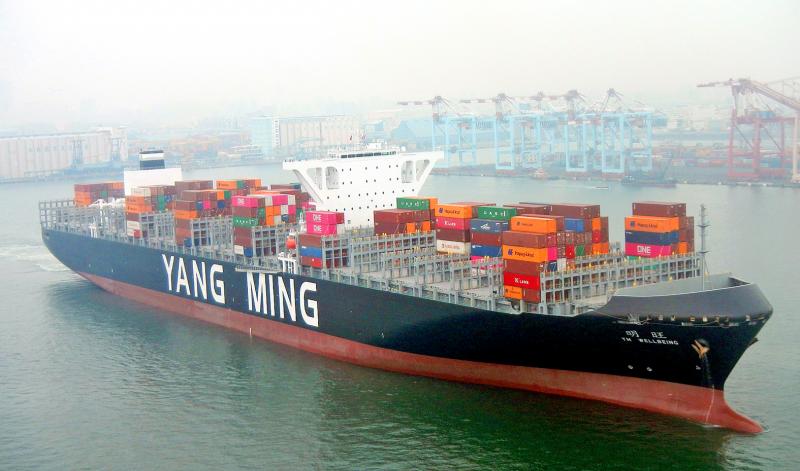Container shipper Yang Ming Marine Transport Corp (陽明海運) is to raise year-end bonuses for its employees to 12 months of wages on average and is to raise salaries by about 4 percent, after a bumper year that saw a significant rise in shipping rates and profit, the firm said.
Yang Ming’s board of directors on Friday approved the bonus and pay raise plans, two weeks after larger rival Evergreen Marine Corp (長榮海運) reportedly paid bonuses of as much as 40 months of salary to its employees.
Shippers’ profits last year received a boost from surging freight rates amid strong global demand and port congestion due in part to COVID-19 curbs.

Photo courtesy of Yang Ming Marine Transport Corp via EPA-EFE
Evergreen reported NT$158.28 billion (US$5.73 billion) in net profit in the first nine months of last year, up 1,347.32 percent from a year earlier, or earnings per share of NT$30.27.
Yang Ming reported NT$109.8 billion in net profit in the same period, up 5,839 percent from a year earlier, or earnings per share of NT$32.73.
For the whole of last year, Evergreen registered NT$489.40 billion in revenue, up 136.1 percent from a year earlier, while Yang Ming posted NT$334.48 billion in revenue, up 120.22 percent.
In addition to performance-based year-end bonuses, Yang Ming annually issues fixed year-end bonuses of one month of the respective employee’s salary.
This year, its employees would receive 13 months of wages as year-end bonuses ahead of the Lunar New Year holiday, which is to start on Saturday next week.
Local media reported that Yang Ming might issue extra bonuses for the Dragon Boat and Mid-Autumn festivals, with bonuses this year totaling up to 30 months of salary.
To meet robust global demand for container cargo shipping services, Yang Ming is building five new mega vessels, each with a capacity to carry 15,000 20-foot equivalent units of cargo.
The company said it spent NT$10 billion in capital expenditure last year.
As it is adding new ships, Yang Ming’s spending for this year could double, the shipper said.

CHIP WAR: Tariffs on Taiwanese chips would prompt companies to move their factories, but not necessarily to the US, unleashing a ‘global cross-sector tariff war’ US President Donald Trump would “shoot himself in the foot” if he follows through on his recent pledge to impose higher tariffs on Taiwanese and other foreign semiconductors entering the US, analysts said. Trump’s plans to raise tariffs on chips manufactured in Taiwan to as high as 100 percent would backfire, macroeconomist Henry Wu (吳嘉隆) said. He would “shoot himself in the foot,” Wu said on Saturday, as such economic measures would lead Taiwanese chip suppliers to pass on additional costs to their US clients and consumers, and ultimately cause another wave of inflation. Trump has claimed that Taiwan took up to

A start-up in Mexico is trying to help get a handle on one coastal city’s plastic waste problem by converting it into gasoline, diesel and other fuels. With less than 10 percent of the world’s plastics being recycled, Petgas’ idea is that rather than letting discarded plastic become waste, it can become productive again as fuel. Petgas developed a machine in the port city of Boca del Rio that uses pyrolysis, a thermodynamic process that heats plastics in the absence of oxygen, breaking it down to produce gasoline, diesel, kerosene, paraffin and coke. Petgas chief technology officer Carlos Parraguirre Diaz said that in

SUPPORT: The government said it would help firms deal with supply disruptions, after Trump signed orders imposing tariffs of 25 percent on imports from Canada and Mexico The government pledged to help companies with operations in Mexico, such as iPhone assembler Hon Hai Precision Industry Co (鴻海精密), also known as Foxconn Technology Group (富士康科技集團), shift production lines and investment if needed to deal with higher US tariffs. The Ministry of Economic Affairs yesterday announced measures to help local firms cope with the US tariff increases on Canada, Mexico, China and other potential areas. The ministry said that it would establish an investment and trade service center in the US to help Taiwanese firms assess the investment environment in different US states, plan supply chain relocation strategies and

Japan intends to closely monitor the impact on its currency of US President Donald Trump’s new tariffs and is worried about the international fallout from the trade imposts, Japanese Minister of Finance Katsunobu Kato said. “We need to carefully see how the exchange rate and other factors will be affected and what form US monetary policy will take in the future,” Kato said yesterday in an interview with Fuji Television. Japan is very concerned about how the tariffs might impact the global economy, he added. Kato spoke as nations and firms brace for potential repercussions after Trump unleashed the first salvo of